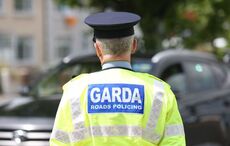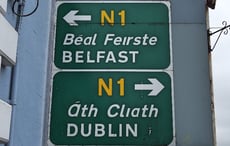Majella Moynihan has opened up about her harrowing experience being pregnant as a trainee garda (police officer) in 1985 in Dublin, where she faced dismissal, a disciplinary hearing, and was pressured into giving her child up for adoption.
Thirty-four years after her appalling treatment by An Garda Síochána, Ireland's police force, retired officer Majella Moynihan has revealed what she went through as a pregnant trainee garda.
“I felt was that I was the guinea pig, they put me up there and they said to me ‘we’ll show other women if you get pregnant this is what you’re going to be let into’. This is what’s going to be done to you’,” she said in a brave interview with RTE's Sean O'Rourke following the initial broadcast of her story on RTE Documentary on One.
Moynihan, who was 22 at the time, shared that she engaged in a relationship with another trainee garda - there were no rules prohibiting this at the time and she says they were not the only ones. When she discovered that she was pregnant, she kept the information to herself for 17 weeks before eventually confiding in a female inspector.
Read More: Three Irish police arrested in corruption probe
Her superiors then became involved in her pregnancy at a wholly inappropriate level, shaming her for having pre-marital sex and pressuring her to give her baby, David, up for adoption. Moynihan was also interrogated and threatened with dismissal.
Her account of giving birth is traumatic :
"They wouldn’t give me the epidural and I was in absolute horrific pain and I wept myself and I just felt in there that I was nothing to them. And when David was born, they just took him. They just took him.
“From the first time I told the authorities it was ‘adoption, adoption, adoption’. And I often wonder if I had been supported by them [the guards] would I have kept him, because this is a decision I regret to this day.”
The child's father was fined £90 and Moynihan was required to testify at his hearing, an experience she recalls as very disturbing, the only other woman in the room being the court stenographer.
Our story in this morning's @irishexaminer that Garda Commissioner is to provide a personal apology to Majella Moynihan @cathshan @Ocionnaith #IEstaffhttps://t.co/hCU2yz8qBy via @CormacJOKeeffe pic.twitter.com/QBO06N6Ckg
— Irish Examiner (@irishexaminer) June 17, 2019
She eventually received the news that she would not be fired - not out of sympathy, but because her superiors feared that her story would inspire other female guards to travel to England for abortions.
“The meeting was arranged and what came back to me from the meeting was ‘you’re not being sacked Majella’. And the reason being that Archbishop McNamara said is that if you’re to be sacked you’re opening the gates for other beangardaí [female guards] to go to England.”
Read More: Irish cop to be fired after having sex with porn star on patrol car
In the years following, Moynihan shared that she attempted suicide five times and was told my multiple colleagues that she was "done" as a garda.
Moynihan has since received apologies from Ireland's Minister for Justice Charlie Flanagan and Garda Commissioner Drew Harris. Minister Flanagan acknowledged that Moynihan “faced an appalling ordeal at a time in Ireland that was sadly too often characterized by stigma and intolerance.”
Both have scheduled meetings with Moynihan this week.
Drew Harris will give ‘personal apology’ to ex-garda Majella Moynihan https://t.co/Q1KlXyvxYu
— The Irish Times (@IrishTimes) June 17, 2019
Moynihan expressed relief over finally being able to share her story and the powerful reaction to it.
“The response has just been phenomenal for me, I knew it was a big story, but I didn’t think it would get the coverage that it has got. I’m just overjoyed," she said.
“I kept it secret for so many years because I had so much shame and now it is no longer my story of shame, it is their shame and I feel so vindicated.
“I’m so grateful to the people that heard me and believed my story."
Read More: Outrage as Irish Minister for Justice tries to outlaw photographing the police




Comments